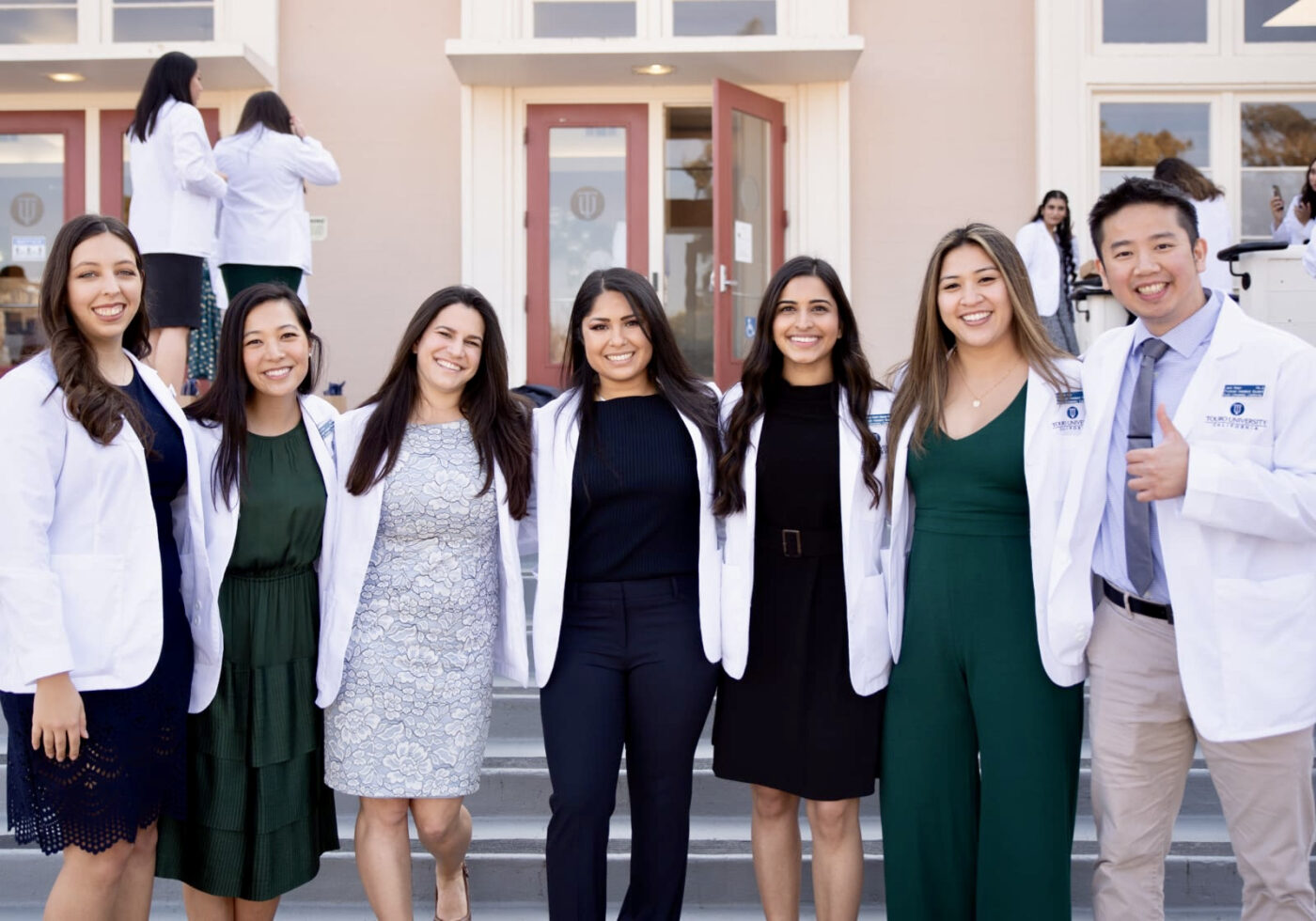Updated 02/10/2025
PA vs Doctor
Physician assistants and doctors share many of the same duties and responsibilities. They both attend several years of school and work directly with patients, treating diseases and prescribing medications. But the two aren’t quite the same.
If you’re considering a career in the medical field, knowing the differences between a physician vs doctor can help you choose the right career path. Let’s explore what makes each one unique and how to choose which one to pursue.
PA vs Doctor Educational Requirements
The differences between a PA vs doctor begin long before either start practicing.
To become a doctor, students are required to complete a minimum of nine years of school and medical training. Generally, you’ll need at least a 3.64 GPA to enter medical school, along with an MCAT score of 508 or greater.
The coursework is more complex and requirements are stringent. Doctors must complete 3-7 years of residency training, as well as obtain and sustain board certification on the national and state levels.
PA requirements are less intense, but still shouldn’t be taken lightly. PAs face about six years of school, with requirements varying slightly between states and specific schools. PAs are required to gain one year of hands-on medical experience (similar to a doctor’s residency) before operating as a full-fledged PA, as well as complete ongoing education requirements to maintain their credentials.
With fewer years of school, becoming a physician assistant is becoming a highly desirable option for students who want an advanced career in the medical field.
Job Functions
There’s a lot of overlap in job functions between a doctor vs PA. They both care directly for patients in diagnosing and treating illness and disease. They both review the patient’s health history to make treatment suggestions and prescribe medications. Also, each one administers and carries out treatment plans and counsels patients.
One of the biggest differences is that doctors are allowed to work autonomously while PAs work under the direct supervision of a doctor. Also, PAs may assist doctors in surgeries but are not allowed to perform them on their own.
Unlike doctors, physicians assistants do not require additional certifications or intensive training to change specialties, which appeals to many students deciding between the two professions.
Educational Cost
Because it takes several more years of school to become a doctor, it’s no surprise that education is also more expensive. The median cost of education is roughly $207,000 for public schools and about $278,000 for a private medical school.
PA school isn’t cheap, but is still a fraction of what it costs to become a doctor. The average cost of a 27-month PA program in the US is about $71,000 for residents and nearly $90,000 for non-residents.
Salary
The earning capacity for a doctor can easily offset the high price tag of education. Typically, doctors earn between $200,00-$300,000 per year (in other words, a single year of employment can technically pay off med school debt). The actual salary will vary depending on specialty, practice area, bonuses, and profit sharing. Generally, specialists fall on the higher end of the earnings spectrum while PCPs tend to earn less.
The PA salary is significantly less by comparison, but it’s still nothing to frown about. The average PA salary is roughly $92,000, but can easily reach into six figures.
Both doctors and PAs are projected to experience significant job growth in the next ten years.
Physician Assistant vs Doctor: Which Career Path is Right for You?
When choosing between a career as a PA vs doctor, it’s important to consider the total picture. It’s not just about the duties you perform, but also how long it will take you to become eligible to practice, how much it will cost you, and what you can expect to earn over your lifetime.
It’s not an uncommon debate, nor is the decision an easy one. Consider competing a Pre-Med Internship or Pre-PA Internship that lets you gain deeper experience in the medical field. International Medical Aid offers pre-med internships abroad in a variety of disciplines so you can make a better-informed decision for your future.
Take time to explore your options and enjoy a fulfilling career you can be proud of.
Update Date: February 10, 2025
Physician assistants (PAs) and doctors share similar responsibilities in patient care, from diagnosing illnesses and prescribing medications to developing treatment plans and directly engaging with patients. While both career paths require strict training and dedication, they differ in educational requirements, scope of practice, and overall career trajectories. This comprehensive update integrates recent developments, emerging trends, and broader contextual factors to help prospective healthcare professionals make an informed decision about pursuing a career as a physician assistant or a doctor.
Physician Assistant or Doctor: Which Career Path is Right for You?
When choosing between a career as a PA vs doctor, it’s important to consider the total picture. It’s not just about your duties but also how long it will take you to become eligible to practice, how much it will cost you, and what you can expect to earn over your lifetime.
It’s not an uncommon debate, nor is the decision an easy one. Consider competing a Pre-Med Internship or Pre-PA Internship that lets you gain deeper experience in the medical field. International Medical Aid offers pre-med internships abroad in a variety of disciplines so you can make a better-informed decision for your future.
Take time to explore your options and enjoy a fulfilling career you can be proud of.
Educational Requirements and Job Functions
Educational Requirements
Becoming a doctor traditionally involves a lengthy educational journey that begins with an extensive undergraduate program and continues through medical school, which typically lasts for several years. Aspiring physicians must maintain competitive academic records—often requiring a minimum GPA of around 3.64 and strong MCAT scores—to gain admission to medical school. Once accepted, students undergo an intense curriculum that prepares them for the demands of residency, 3 to 7 years of practical training where they refine their clinical skills. Board certification, which requires ongoing education and periodic re-examination, ensures that doctors maintain high standards of care throughout their careers.
In contrast, the path to becoming a physician assistant is shorter but still demanding. PA programs generally require approximately 27 months of study and a prerequisite period of hands-on medical experience. Although the academic rigor is slightly less intensive than medical school, PAs are expected to engage in continual professional development to keep up with advancements in the field. This more streamlined educational path makes the PA career attractive for many who desire advanced medical practice without the extended time commitment required to become a doctor.
Job Functions
Both doctors and PAs are integral to patient care, but there are key differences in how they operate within the healthcare system. Doctors typically work autonomously, managing complex cases and leading clinical teams. Their extensive training and experience allow them to diagnose and treat various conditions independently. On the other hand, PAs generally work under the supervision of physicians, assisting in surgeries, performing routine examinations, and implementing treatment protocols.
Recent regulatory changes have begun to grant PAs greater autonomy, particularly in rural or underserved areas, enabling them to initiate treatment plans and perform certain procedures that were once solely within the purview of doctors. This evolving role reflects a broader trend toward collaborative care models that leverage the unique strengths of each profession.
Educational Cost and Salary Considerations
The financial implications of these career paths are significant. The extended education required to become a doctor comes with a substantial price tag, with median costs reaching approximately $207,000 for public institutions and up to $278,000 for private programs. Despite these expenses, many physicians can offset their educational debt through high earning potential, with annual salaries typically ranging from $200,000 to $300,000, and even higher in certain specialties.
PA programs are considerably less expensive, with average costs ranging between $71,000 and $90,000, depending on residency status and institution. Although the average salary for a PA is lower—roughly $92,000 annually—the shorter training period allows graduates to enter the workforce sooner, which can be an important consideration for many prospective healthcare providers. Both professions expect robust job growth in the coming years due to demographic shifts and an increasing demand for healthcare services.

Evolving Roles and Enhanced Scope of Practice
Regulatory Changes and Expanded Responsibilities
Recent shifts in healthcare policy have led to expanding the scope of practice for PAs, particularly in areas where physician shortages are most acute. In many regions, state regulations have been modified to allow PAs greater autonomy, enabling them to initiate treatment plans and perform procedures once reserved for doctors. These changes have been driven by legislative advocacy, efforts to improve healthcare access in underserved communities, and a growing body of evidence demonstrating that PAs can deliver care with outcomes comparable to those of physicians when working collaboratively.
New Collaborative Models
Modern healthcare increasingly emphasizes a team-based approach. Integrated care teams, which bring together doctors, PAs, nurse practitioners, pharmacists, and other allied health professionals, have become central to delivering comprehensive patient care. In these settings, doctors often lead multidisciplinary teams. At the same time, PAs contribute significantly by assisting in preoperative and postoperative care, managing routine clinical tasks, and ensuring that treatment protocols are followed accurately. This collaborative model not only improves patient outcomes but also optimizes the efficiency of healthcare delivery.
Telemedicine and Technological Advancements
Telehealth Expansion
The rapid growth of telemedicine in recent years has transformed how healthcare is delivered. Accelerated by the global COVID-19 pandemic, both doctors and PAs now routinely conduct virtual consultations, monitor patients remotely, and follow up digitally. Telemedicine has expanded access to care, allowing healthcare providers to reach patients in remote or underserved areas, and has led to improvements in patient outcomes through timely intervention. The ease of communication afforded by virtual care platforms has also fostered enhanced collaboration among healthcare team members across various locations.
Artificial Intelligence and Decision Support Systems
Artificial intelligence has emerged as a powerful tool in modern medicine. Both doctors and PAs now employ AI-driven diagnostic systems and predictive analytics to analyze large datasets, identify patterns, and support clinical decision-making. This technology enhances diagnostic accuracy by detecting conditions—such as cancer, heart disease, and diabetes—earlier than traditional methods. Additionally, AI facilitates personalized treatment plans by integrating patient history, genetic information, and lifestyle factors while streamlining administrative tasks to allow clinicians to focus more on patient care.
Wearable Technology and Remote Monitoring
The integration of wearable devices into daily life has revolutionized patient monitoring. Devices such as smartwatches and glucose monitors collect real-time data that healthcare providers can use to track chronic conditions and adjust treatment plans promptly. This technology not only encourages patients to become more actively involved in their health management but also enables early detection and intervention, ultimately contributing to better long-term health outcomes.
Post-Pandemic Healthcare Landscape
The Lasting Impact of COVID-19
The COVID-19 pandemic permanently reshaped many aspects of healthcare delivery. Healthcare providers now adhere to more stringent infection control measures, and facilities have adapted by developing robust protocols for managing future public health emergencies. The pandemic also brought mental health to the forefront of patient care, leading to the incorporation of mental health screenings and support into routine medical practice. Additionally, the crisis underscored the importance of provider resilience, prompting institutions to implement wellness programs to prevent burnout and promote overall well-being among healthcare workers.
Pandemic-Driven Innovation in Training
In response to the challenges posed by the pandemic, medical education has undergone significant transformation. Virtual simulations, online case studies, and remote collaboration have become standard training elements for doctors and PAs. These innovations have provided greater flexibility, reduced costs, and enriched the learning experience by allowing students to engage with realistic clinical scenarios in a controlled, risk-free environment. This shift has ensured that future healthcare professionals are well-prepared to meet the demands of a rapidly changing medical landscape.
Innovations in Medical Education and Training
Curriculum Reforms
Educational institutions continually adapt curricula to better prepare students for modern healthcare challenges. Interdisciplinary learning is now emphasized, with courses integrating multiple fields to promote a holistic understanding of patient care. In addition, telemedicine, digital health records, and health informatics have become integral parts of both medical and PA training programs. Simulation-based learning through advanced labs and virtual reality platforms has further enhanced students’ clinical readiness.
New Certification and Residency Programs for PAs
As PAs’ scope of practice expands, new certification and residency programs have been introduced to equip them with specialized skills. These programs enable PAs to gain certifications in areas such as emergency medicine, surgery, and orthopedics, and some institutions now offer extended residency opportunities in critical care and pediatrics. Furthermore, ongoing education requirements ensure that doctors and PAs remain current with the latest medical advancements through online and in-person training sessions.
Global Exchange Programs and Collaborative Learning
Many medical and PA programs now offer international exchange opportunities to foster cultural exchange and broaden clinical perspectives. These initiatives provide students with diverse clinical experiences, help develop cultural competence, and facilitate the establishment of global professional networks. Such programs enrich the educational experience by exposing future healthcare providers to various healthcare systems and practices worldwide.
Changing Dynamics in the Healthcare Workforce
Diversity and Inclusion
There is an increasing emphasis on creating a diverse and inclusive healthcare workforce that reflects the communities it serves. Efforts to recruit individuals from varied backgrounds are underway, with scholarships, mentorship programs, and targeted recruitment initiatives playing a key role. By enhancing representation, healthcare providers can better address cultural differences in patient care and work to reduce health disparities among minority populations.
Work-Life Balance and Professional Well-Being
Modern healthcare institutions are increasingly aware of the challenges posed by long work hours and high-stress environments. As a result, many organizations are implementing flexible scheduling, offering part-time opportunities, and establishing wellness programs that include counseling, stress management workshops, and other supportive measures. These initiatives contribute to a more supportive workplace culture, helping retain talent and enhancing overall job satisfaction among doctors and PAs.
Compensation Trends and Economic Factors
Economic factors continue to influence the career decisions of healthcare professionals. Recent trends indicate that performance-based incentives, including bonuses and profit-sharing arrangements, are becoming more common to reward clinical excellence. Additionally, compensation varies significantly based on geographic location, with higher incentives offered in rural and underserved areas. Rising living costs and changes in healthcare funding have also impacted salary structures, prompting ongoing adjustments in compensation models.
Future Prospects and Emerging Trends
Innovative Care Models
The future of healthcare is shaped by innovative care models prioritizing value-based care and patient outcomes. Shifting away from traditional fee-for-service approaches, new models emphasize coordinated care, chronic disease management, and preventive strategies. Patient-centered medical homes and accountable care organizations are emerging as critical frameworks, encouraging collaboration among healthcare providers and ensuring that each team member contributes their unique expertise to optimize patient care.
Integration of Genomics and Personalized Medicine
Advances in genomics and biotechnology are paving the way for a more personalized approach to medicine. Genetic testing is increasingly used to tailor treatments for complex conditions such as cancer and cardiovascular disease. The field of pharmacogenomics is evolving to help clinicians select medications that are most likely effective based on a patient’s genetic profile. By integrating genomic data with clinical insights, healthcare teams are now able to design treatment plans that are both precise and individualized.
Environmental and Social Determinants of Health
There is a growing recognition of the profound impact of environmental and social factors on health outcomes. Modern healthcare providers are increasingly addressing issues such as access to nutritious food, safe housing, and clean environments as part of their overall strategy to improve community health. Interdisciplinary collaborations between clinicians, public health professionals, and social workers are essential in designing interventions that tackle the root causes of health disparities. At the same time, data-driven policymaking helps to guide these efforts at a broader level.
The Role of Research and Innovation
Ongoing research continues to refine best practices in patient care. Comparative studies that evaluate the outcomes of patients treated by doctors versus those managed by PAs provide valuable insights into the most effective models of care. Longitudinal research into career satisfaction and well-being among healthcare professionals also informs future training and support programs. Meanwhile, rapid advancements in medical technology—ranging from new diagnostic tools to breakthrough therapeutics—continuously expand the possibilities for doctors and PAs.
Global Perspectives and Comparative Analysis
International Training Models
Across the globe, many countries are rethinking their medical education systems in response to evolving healthcare challenges. Some nations have implemented accelerated training programs that combine traditional education with intensive practical experience to address local physician shortages. Collaborative international programs facilitate the exchange of knowledge and best practices. At the same time, a renewed focus on primary care education underscores the critical role of mid-level practitioners such as PAs in managing chronic disease burdens.
Cross-Border Regulatory Innovations
As the medical profession becomes increasingly global, regulatory bodies are working to harmonize training and certification standards. Efforts to create international credentialing standards and establish reciprocity agreements make it easier for healthcare professionals to work across borders. Moreover, global telehealth networks are emerging, enabling doctors and PAs to consult with colleagues worldwide and share expertise on complex cases.
Interdisciplinary Collaboration and the Future of Healthcare Delivery
Enhanced Team-Based Approaches
Modern healthcare delivery is increasingly reliant on interdisciplinary collaboration. In many settings, doctors, PAs, nurse practitioners, and other healthcare professionals share decision-making and work together to develop patient-centered treatment plans. Advances in electronic health records have further facilitated seamless communication among team members, reducing errors and enhancing continuity of care. Educational programs that bring medical and PA students together from the outset foster a culture of mutual respect and collaboration essential for effective patient care.
Leadership and Mentorship Programs
Recognizing the need for strong healthcare leadership, many institutions have introduced formal mentorship opportunities and leadership training workshops. These initiatives are designed to help early-career professionals develop skills in conflict resolution, team management, and strategic planning. Research and innovation grants further encourage collaborative projects between doctors and PAs, driving improvements in patient care and advancing the field.
Addressing Burnout and Promoting Resilience
Mental Health and Well-Being Initiatives
The increasing demands on healthcare professionals have led to a renewed focus on mental health and well-being. Many hospitals now offer comprehensive wellness programs that include mental health counseling, mindfulness training, and stress management workshops. In addition, specialized resilience training modules are being integrated into medical and PA programs to better prepare future providers for the challenges of their careers. Peer support networks have also been established to ensure that doctors and PAs access ongoing emotional and professional support.
Institutional Changes to Mitigate Burnout
Healthcare institutions are actively rethinking their operational models to reduce burnout. By redesigning shifts and redistributing workloads, many organizations are helping to prevent excessive fatigue among healthcare workers. Investments in advanced IT systems and additional administrative support have eased the burden of non-clinical tasks, allowing providers to focus more on patient care. Furthermore, recognition programs celebrating professional achievements have contributed to a more positive workplace culture and improved overall job satisfaction.
Long-Term Career Prospects and Economic Considerations
Job Market Projections and Workforce Trends
Research indicates that the demand for doctors and PAs will continue to grow in the coming years, driven by an aging population and an increasing prevalence of chronic diseases. While evolving compensation models gradually shift towards rewarding quality and outcomes rather than sheer volume, workforce challenges remain, particularly in rural areas. Initiatives to incentivize practice in underserved communities are becoming increasingly important as healthcare evolves.
Economic Implications of Educational Debt
The cost of education remains a crucial factor for many aspiring healthcare professionals. Innovative financing solutions, including loan forgiveness programs and targeted scholarships, are helping mitigate the financial burden of medical training. Although doctors typically have higher lifetime earning potential, the shorter training period for a Physician Associate means they can begin earning sooner, offering a distinct economic advantage for some individuals. As economic pressures evolve, a growing emphasis is on developing sustainable career models that balance financial rewards with personal well-being and professional fulfillment.
Personalized Pathways and Decision-Making Tools
Career Guidance and Mentoring Resources
For those weighing the decision between pursuing a career as a doctor or a physician assistant, personalized guidance has never been more accessible. Various online platforms now offer interactive tools that help prospective healthcare providers compare career paths based on factors such as educational requirements, salary projections, and work-life balance. Virtual career fairs and informational webinars hosted by professional organizations provide up-to-date insights and opportunities for direct interaction with seasoned professionals, while robust alumni networks offer mentorship and career advice tailored to individual needs.
Assessing Personal Fit
Ultimately, deciding to become a doctor or a PA depends on carefully evaluating personal priorities. Prospective healthcare providers must consider the time commitment, potential work hours, financial implications, and overall impact on lifestyle. While some individuals are drawn to the autonomy and specialized expertise of a physician’s career, others may prefer the collaborative, team-oriented environment and shorter training period offered by the PA route. Evaluating these factors in light of personal interests and long-term career goals is essential in making the best choice.
The Road Ahead: Future Innovations and Global Impact
Emerging Research and Innovation
Breakthroughs in biotechnology, regenerative medicine, and advanced diagnostic technologies are set to transform the future of healthcare. Ongoing interdisciplinary research involving bioengineers, data scientists, and clinicians promises to yield next-generation solutions to further refine patient care.
Continuous advancements in imaging, laboratory testing, and molecular diagnostics will drive early detection and more effective treatment of various conditions, ensuring that doctors and PAs remain at the forefront of medical innovation.
Global Collaboration and Best Practices
International cooperation plays an increasingly vital role in shaping the future of healthcare. Global initiatives to standardize training and certification processes facilitate the exchange of best practices among healthcare professionals worldwide. Knowledge-sharing networks and international telehealth collaborations enable doctors and PAs to collectively address challenges, such as emerging infectious diseases and climate-related health issues, thereby improving patient outcomes globally.
The Impact of Social Media and Digital Platforms
Digital platforms have reshaped how healthcare professionals communicate, collaborate, and continue their education. Online communities, virtual conferences, and professional networking sites have become essential tools for sharing research findings, discussing clinical challenges, and staying informed about the latest advancements. These digital innovations empower clinicians to engage directly with their patients, providing access to personalized health data and fostering more effective communication throughout the care process.
Final Thoughts
The decision to pursue a doctor or physician assistant career is complex and deeply personal, influenced by educational commitments, financial considerations, and individual career aspirations. Enhanced scopes of practice, innovative educational models, and rapid technological advancements are reshaping both fields, creating opportunities for more collaborative, efficient, and patient-centered care. Whether you are drawn to the comprehensive, autonomous training of a physician or the dynamic, team-based environment of a PA, both paths offer rewarding opportunities to make a meaningful impact on patient health.
By engaging in internships, mentorship programs, and continuing education, you can gain firsthand experience to navigate this evolving landscape. The future of healthcare is bright and full of promise for those who remain adaptable, informed, and committed to excellence in patient care. Your choice today will shape your career trajectory and contribute to the broader evolution of the healthcare system for generations to come.





